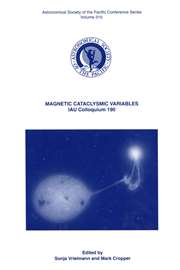No CrossRef data available.
Article contents
The X-Ray Timing Explorer*
Published online by Cambridge University Press: 12 April 2016
Abstract
The capabilities of the X-ray Timing Explorer (XTE) are described with particular attention paid to current scientific problems it will address from galactic neutron star systems to active galactic nuclei. It features a low-background continuous 2-200 keV response with large apertures (a 0.63-m2 proportional counter array and a 0.16-m2 dual rocking NaI/CsI scintillation array). Rapid response (in hours) to temporal phenomena, e.g. transients, is obtained by virtue of a scanning all-sky monitor and rapid maneuverability. XTE will carry out detailed energy-resolved studies of phenomena close to neutron stars (e.g. QPO’s) because of its sub-millisecond timing (to 10 μs), its high telemetry rates (to 256 kb/s), and the high throughput of its data system (to ≳ 2 × 105 c s−1).
- Type
- II. Future Missions
- Information
- International Astronomical Union Colloquium , Volume 123: Observatories in Earth Orbit and Beyond , 1990 , pp. 89 - 110
- Copyright
- Copyright © Kluwer 1990
Footnotes
This article originally appeared in Advances in Space Research (Bradt, Swank and Rothschild 1990). It is reproduced here (with minor changes) with the permission of Pergamon Press.


